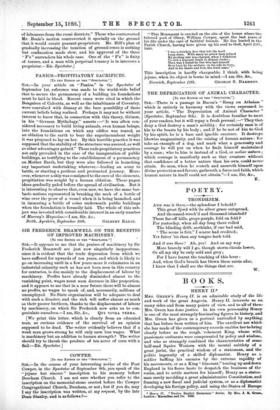PANICS—PROPITIATORY SACRIFICES.
[TO THE EDITOR OF THE " SPECTATOR."]
Sin,—In your article on " Panics," in the Spectator of September 1st, reference was made to the world-wide belief that to secure the permanency of a building its foundations must be laid in blood. Recent cases were cited in which the Bengalees of Calcutta, as well as the inhabitants of Coventry, were convulsed with dismay at the bare possibility of these current beliefs being realised. Perhaps it may not be without interest to know that, in connection with this theory, Grimm, in his " German Mythology," asserts :—" It was often con- sidered necessary to build living animals, even human beings, into the foundations on which any edifice was reared, as an oblation to the earth to bear the superincumbent weight . it was proposed to lay on her. By this horrible practice it was supposed that the stability of the structure was assured, as well as other advantages gained." These rude propitiatory practices not only prevailed in the case of the inauguration of public buildings, as testifying to the establishment of a permanency on Mother Earth, but they were also followed in launching any important undertaking whatever,—leading an army to battle, or starting a perilous and protracted journey. More- over, whenever a ship was consigned to the care of the elements, propitiation was sought by a human oblation. These pagan ideas gradually paled before the spread of civilisation. But it is interesting to observe that, even now, we have the same bar- baric notions represented in breaking the neck of a bottle of wine over the prow of a vessel when it is being launched, and in immuring a bottle of coins underneath public buildings when the foundation is formally laid. The whole of this sub- ject was invested with considerable interest in an early number of Murray's Magazine.—I am. Sir, &c., Beith, Ayrshire, September 10th. GILBERT EADIE.


































 Previous page
Previous page